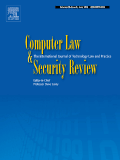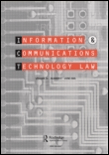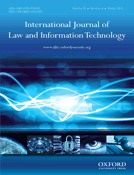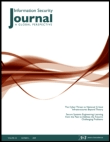
Computer Law & Security Review
Scope & Guideline
Innovating Legal Perspectives in a Cyber-Driven World
Introduction
Aims and Scopes
- Cybersecurity Law and Policy:
The journal consistently addresses issues related to cybersecurity legislation, including responses to cyber threats and the legal frameworks that govern cybersecurity practices. - Data Protection and Privacy:
A significant focus on data protection laws, particularly the General Data Protection Regulation (GDPR) and its impact on privacy rights, data sovereignty, and the handling of personal data. - Artificial Intelligence Regulation:
Exploration of the legal challenges posed by artificial intelligence, including liability issues, ethical considerations, and regulatory frameworks for AI technologies. - Digital Transformation and Governance:
Research on how digitalization affects governance structures, including the regulation of digital platforms, e-commerce, and the implications of technology on public policy. - Comparative Legal Studies:
The journal often includes comparative analyses of legal systems, particularly between the EU, the US, and China, examining how different jurisdictions tackle similar technological challenges.
Trending and Emerging
- AI Ethics and Regulation:
There is a growing emphasis on the ethical implications of artificial intelligence, including fairness, accountability, and transparency, reflecting the need for comprehensive regulatory frameworks. - Privacy in the Digital Age:
Recent titles indicate an increasing focus on privacy rights, particularly in relation to new technologies such as tracking apps, personal data protection laws, and the implications of the GDPR. - The Impact of Blockchain and Cryptocurrencies:
Research on blockchain technology and cryptocurrencies is expanding, especially regarding regulatory challenges and implications for financial markets and data protection. - Data Sovereignty and International Law:
Emerging discussions on data sovereignty highlight the complexities of cross-border data transfers and the legal implications of national data protection laws in a globalized digital economy. - Cybersecurity and Critical Infrastructure Protection:
There is a heightened focus on the legal frameworks necessary to protect critical infrastructures from cyber threats, reflecting increasing concerns over national security and public safety.
Declining or Waning
- Traditional Intellectual Property Issues:
There seems to be a waning interest in conventional intellectual property topics, particularly as the focus shifts towards more complex issues like digital rights and AI-generated content. - General Cybercrime Legislation:
While cybercrime remains a critical issue, discussions specifically centered on traditional cybercrime laws are less frequent, possibly overshadowed by broader cybersecurity and data protection themes. - Regulatory Approaches to Legacy Technologies:
The journal has seen a decrease in papers addressing legacy technologies and their regulatory frameworks, as the emphasis has shifted towards emerging technologies like AI and blockchain.
Similar Journals

MINNESOTA LAW REVIEW
Transforming Legal Scholarship through Analytical ExcellenceMINNESOTA LAW REVIEW is a prestigious academic journal dedicated to advancing legal scholarship and discourse, published by the MINN LAW REVIEW FOUND in the United States. Established in 1976, this journal has become a cornerstone in the field of law, achieving an impressive Q1 ranking in the Law category for 2023, underscoring its significance and influence in legal studies, with a Scopus rank placing it in the 65th percentile among social sciences law journals. The ISSN number for both print and electronic editions is 0026-5535, ensuring broad accessibility to its scholarly contributions. With a commitment to publishing innovative and analytical articles that address contemporary legal issues, the MINNESOTA LAW REVIEW serves as an essential resource for researchers, students, and legal professionals seeking to deepen their understanding and engage with critical legal concepts. While it does not currently provide open access, its wide array of topics spans various disciplines within law, fostering a vibrant academic community dedicated to the exploration of legal principles and their applications. The journal’s editorial office can be found at 229 19TH AVE SOUTH, UNIVERSITY OF MINNESOTA, MINNEAPOLIS, MN 55455, where a team of experts curates content that reflects the evolving landscape of legal thought.

Revista Chilena de Derecho y Tecnologia
Illuminating the Convergence of Law and Technology.Revista Chilena de Derecho y Tecnología is a distinguished open access journal published by Universidad de Chile, Facultad de Derecho, dedicated to exploring the interplay between law and technology in a rapidly evolving digital landscape. Since its inception, the journal has established itself as an essential resource for researchers, legal professionals, and students, facilitating critical dialogue and scholarship in this interdisciplinary field. With an impactful presence in the academic community, the journal has achieved notable rankings, including a Q1 classification in Law and a Q3 classification in both Computer Networks and Communications and Information Systems for the year 2023. Furthermore, the journal offers broad accessibility to its readers, having adopted an open access model since 2012, ensuring that cutting-edge research is available to a wider audience. Based in Santiago, Chile, the Revista Chilena de Derecho y Tecnología serves as a vital platform for advancing knowledge, fostering innovation, and responding to the legal challenges posed by emerging technological advancements, thereby contributing significantly to its respective fields.

EUROPEAN JOURNAL OF HEALTH LAW
Fostering interdisciplinary insights in health law.The European Journal of Health Law, published by Brill, stands as a pivotal resource for scholars and practitioners at the intersection of health policy and law since its inception in 1994. This esteemed journal, with an ISSN of 0929-0273 and an E-ISSN of 1571-8093, delves into pressing issues affecting health law across Europe and beyond, providing a platform for rigorous scholarly discourse. It is categorized in the Q4 quartile for Health Policy and Q3 for Law, highlighting its crucial role in advancing knowledge in these fields. While the journal is not an open-access publication, its content remains vital for researchers, students, and professionals seeking to navigate the complexities of health law amidst evolving legal frameworks. With an increasing focus on interdisciplinary studies, the journal aims to foster a deeper understanding of legal principles and their application to health care governance, policy-making, and ethical considerations, making it an indispensable reference for those committed to enhancing health law practice and scholarship.

Information & Communications Technology Law
Shaping the Future of ICT Law Through Insightful AnalysisInformation & Communications Technology Law, an esteemed journal published by Routledge Journals, Taylor & Francis Ltd, serves as a vital platform for the dissemination of critical research and analysis in the intersecting fields of law, communication, and computer science. Established in 1992, this journal has continuously evolved to address the dynamic landscape of information technology and its legal implications, maintaining a significant H-Index that reflects its scholarly impact. With a notable impact factor that places it in the second quartile for communication and law disciplines, and in the third quartile for computer science applications as of 2023, it ranks impressively within the Scopus Metrics—highlighting its relevance and reach among global academia. Covering vital topics from data privacy to intellectual property rights in the digital age, the journal appeals to researchers, practitioners, and students alike by offering insightful articles that explore contemporary issues and emerging trends within ICT law. Although it does not currently offer open access options, its comprehensive articles and reviews are indispensable for anyone seeking to understand the complexities of technology regulation and legal frameworks.

Australian Journal of Competition and Consumer Law
Exploring the Frontiers of Australian Legal FrameworksThe Australian Journal of Competition and Consumer Law, published by LAWBOOK CO LTD, stands as a vital resource for scholars, practitioners, and students in the fields of competition law and consumer protection. With its ISSN 1838-9260, this journal offers insightful analyses and critical discussions that delve into contemporary issues, trends, and emerging challenges within the realm of competition and consumer legislation in Australia and beyond. Although it does not currently feature Open Access options, it is designed to foster a deeper understanding of legal frameworks and economic considerations affecting consumers and businesses. The journal is notable for its commitment to academic rigor and relevance, making it an essential publication for those seeking to navigate the intricacies of law in today's dynamic marketplace.

International Journal of Law and Information Technology
Transforming Legal Perspectives through Technological Insights.The International Journal of Law and Information Technology, published by Oxford University Press, stands as a leading forum for the exploration of the evolving intersection between law and information technology. With its ISSN 0967-0769 and E-ISSN 1464-3693, this esteemed journal has been at the forefront of academic discourse since its inception in 1993 and is poised to continue influencing the landscape of legal scholarship and information sciences until at least 2024. With a prestigious categorization in the Q2 quartile for both Law and Library and Information Sciences, the journal is prominently ranked in the 76th and 64th percentiles respectively within Scopus rankings. Offering insights on vital themes such as privacy, intellectual property, and technological regulation, the International Journal of Law and Information Technology provides a valuable resource for researchers, practitioners, and students alike, facilitating a deeper understanding of the legal challenges and opportunities presented by technological advancements. While not an open-access publication, the rigorous peer-reviewed articles serve to enrich the global academic community’s knowledge in this critical and dynamic field.

WASHINGTON LAW REVIEW
Where Legal Minds Converge and InnovateWASHINGTON LAW REVIEW, published by the University of Washington School of Law, is a premier legal journal that plays an essential role in the dissemination of scholarly work in the field of law. With a longstanding commitment to excellence, this journal has been pivotal in shaping legal discourse since its inception. It is ranked in the Q2 quartile in Law, as per 2023 evaluations, and holds a notable position within the top 54th percentile of its category on Scopus. The journal’s extensive publication history, covering years from 1973 to 2024, provides a rich repository of legal scholarship, making it a valuable resource for researchers, practitioners, and students alike. While the journal does not currently offer open access, its authoritative articles cover a diverse array of topics within legal studies, ensuring that the most relevant and impactful discussions are accessible to the academic community and beyond. For those looking to stay informed about cutting-edge legal issues and advancements, WASHINGTON LAW REVIEW remains an indispensable asset in the pursuit of knowledge and advocacy in the realm of law.

HARVARD LAW REVIEW
Shaping Legal Thought Through Rigorous Scholarship.HARVARD LAW REVIEW, an esteemed publication by the Harvard Law Review Association, stands as a cornerstone of legal scholarship in the United States, boasting an impressive ISSN of 0017-811X and E-ISSN 2161-976X. Renowned for its rigorous editorial standards and comprehensive analyses, this journal occupies the prestigious Q1 category in Law, ranking #149 out of 1025 in Scopus, which places it in the 85th percentile among its peers in the Social Sciences Law category. With a publication history stretching from 1973 to 2024, it consistently features groundbreaking articles, influential essays, and critical commentaries that shape contemporary legal thought. Although not an open-access journal, HARVARD LAW REVIEW remains indispensable for researchers, professionals, and students who seek to engage deeply with the evolving landscape of law. Its rigorous academic focus empowers scholars and practitioners alike, making it a vital resource in the field.

Information Security Journal
Advancing the Frontiers of Information Security.The Information Security Journal, published by Taylor & Francis Inc, is a pioneering platform dedicated to disseminating knowledge in the realms of information security, computer science applications, and information systems management. With an ISSN of 1939-3555 and an E-ISSN of 1939-3547, this journal has successfully carved its niche within the Q2 quartile of the 2023 rankings for both Computer Science Applications and Information Systems and Management, while also being recognized in Q3 for the Software category. Located in the United Kingdom, the journal has been committed to advancing research and fostering innovation from 2008 through 2024, making it an essential resource for academics and professionals alike. With a significant Scopus ranking in its fields—placing 43rd out of 148 in Decision Sciences and 271st out of 817 in Computer Science Applications—the journal stands as a vital source of interdisciplinary insights. Although it does not currently offer open access options, the quality of publications and the journal's dedication to the field ensure that it remains a compelling choice for researchers seeking to publish their findings or stay abreast of current developments in information security.

Asia Pacific Law Review
Navigating Complex Legal Issues in the Asia PacificWelcome to the Asia Pacific Law Review, a prestigious academic journal published by Taylor & Francis Ltd that serves as a vital resource for scholars, practitioners, and students in the field of law. With its ISSN 1019-2557 and E-ISSN 1875-8444, this journal critically examines legal issues pertinent to the Asia Pacific region and promotes scholarly discourse. Recognized in the Q3 category for law by the 2023 category quartiles, the Asia Pacific Law Review stands out with a Scopus ranking of #574 out of 1025, placing it in the 44th percentile within the Social Sciences _ Law category. Spanning from 2008 to 2024, the journal aims to present innovative research, policy analyses, and significant case studies that illuminate the evolving legal landscape in the region. While the journal does not offer Open Access, it remains an essential platform for high-quality legal scholarship, contributing to the advancement of legal knowledge and practice in the Asia Pacific area.